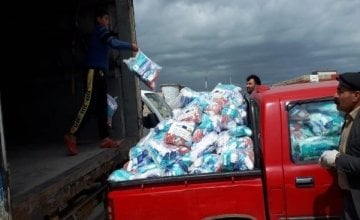
Read our 2024 annual report

Knowledge Hub
Concern teams in race against the clock as COVID-19 pandemic spreads

Concern Worldwide is ramping up efforts to support communities in some of the world’s poorest countries, amid indicators that the COVID-19 pandemic is spreading in Africa.
The World Health Organisation (WHO) reported this week that among 47 countries in Africa, nearly 60% are reporting COVID-19 cases in multiple locations, compared with around 21% two weeks ago. There are also clusters of cases and community spread in at least 16 countries.
The WHO confirmed that there are less than 5,000 intensive care beds available for use during the pandemic in 43 countries in Africa. This equates to five beds per million people, compared to 4,000 beds per million people in Europe.
In the 41 countries which responded to WHO, there are less than 2,000 functioning ventilators.
“We have seen the devastation that this pandemic has caused in countries with developed health systems, but in the least developed countries where we work, the harsh reality is that front line health staff will not be the ones who save most lives, it will be down to mass community mobilization,” Concern’s International Programme Director Anne O’Mahony said.
Ebola experience
Concern is building on the experience gained from the battle against Ebola in west Africa from 2013-16 and more recently in the Democratic Republic of the Congo. “By working with communities, raising awareness of the need for hand washing and hygiene, providing people with soap and water, and supporting the local health clinics, we played a major role in protecting people from Ebola,” Ms O’Mahony said. “Many of these lessons are transferrable in the battle to beat COVID-19.”
The WHO report underlined the futility of relying on poorly resourced and underfunded medical systems to protect poor communities, she said. “The biggest weapons we have to protect people in the poorest countries will be community awareness, accurate information and a huge emphasis on good hygiene practices,” she said. “It’s not the dramatic image we see every day on our TVs of medics in PPEs, but \it’s our best chance to save lives.”
Concern's response
Among the steps being taken by Concern team’s are:
-
In northern Iraq, our teams distributed soap, detergent, and hygiene kits to 84,000 displaced people in camps for Syrian refugees;
-
In Cox’s Bazar, Bangladesh, we have accelerated our therapeutic food rations and also initiated social distancing and hand sanitation at nutrition treatment centres for the Rohingya population. This will ensure that malnourished children experience no breaks in their treatment;
-
In Sierra Leone, Concern is part of a nationwide health consortium and is the lead agency in five districts supporting health system strengthening. COVID-19 training and ‘durable protection materials’ are being delivered through health centres;
-
Concern teams have led intensified public information ‘wash your hands’ campaigns in Bangladesh, Pakistan, and Malawi;
-
In Afghanistan, our teams in Takhar received an urgent request from the local prison for basic preventative equipment. We have improved the basic water systems at the prison and distributed masks and handwashing liquid for the next 15 days;
-
In Somalia, as the lead on a consortium of NGOs that are providing small cash transfers to the most vulnerable across every district, we are expanding the scale and reach of these distributions to further protect families from slipping deeper into hunger and destitution. Cash transfers will be spent on vital foods and potentially life-saving soap.
For media queries or to organise an interview with a Concern spokesperson contact Eamon Timmins, Media Relations Manager, Concern Worldwide, at eamon.timmins@concern.net or 087 9880524.
Other ways to help
Corporate support
Is your company interested in working together for a common cause?
Fundraise for Concern
From mountain trekking to marathon running, cake sales to table quizzes, there are lots of ways you can support our work.
Buy a gift
With an extensive range of alternative gifts, we have something to suit everybody.
Leave a gift in your will
Leave the world a better place with a life-changing legacy.
Volunteer with Concern
The lots of ways to get involved with our work as a volunteer
School fundraising
Without the generous support from schools, we wouldn't be able to do the work that we do.

